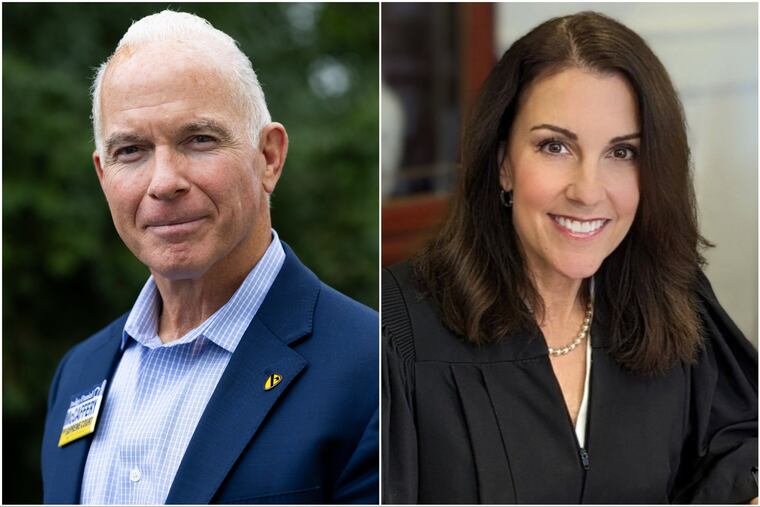Electing judges is a bad idea. There is a much better system.
We want the most qualified individuals to be Supreme Court justices — not the person who raises the most money during their campaigns.

On Tuesday, Pennsylvania voters will elect a justice to fill a vacancy on the Pennsylvania Supreme Court. For many, this will be a hard decision, because they will know little about what the candidates stand for.
Unlike people running for other offices, who can announce on their website and in campaign speeches what they believe about the various issues voters are facing, judicial candidates who follow the Code of Judicial Conduct are not able to inform voters about how they might decide issues that could come before the court. So voters may have little idea about how the candidates feel about gun safety, election issues, abortion rights, and much more.
The key word in the code is impartial. Judges should not be politicians, the code says, and their sole duty is to impartially rule on issues before the court.
The trouble is, the biggest threat to the impartiality and independence of the judiciary is not a candidate letting slip during an interview how they feel about mail-in voting. It’s the money that gets thrown into judicial campaigns.
According to Spotlight PA, Democratic candidates spent $15.8 million to win three open positions on the court in 2015. Since then, political action committees (PACs) — supported by funds flowing from libertarian billionaire Jeffrey Yass — helped a Republican candidate win an open seat on the court in the 2021 election.
It should be no surprise that candidates who raise the most money are far more likely to win their races.
Candidates who raise the most money are far more likely to win their races.
This brings us to the current race between Republican Carolyn Carluccio, president judge of the Montgomery County Court of Common Pleas, and Democrat Daniel D. McCaffery, who sits on the state Superior Court, the appellate court that is immediately below the Supreme Court.
The outcome of this race will have profound implications on the lives of Pennsylvanians. Our state is poised to be a key battleground in the 2024 presidential election, and the person elected to the highest court could become the deciding vote in election cases — not to mention abortion access and other crucial matters.
As of late October, Carluccio spent $742,000 of her own fundraising and had received more than $2 million in donations, most of which came from a conservative PAC supported by Yass. McCaffery spent $2 million over the last month; his largest contributor was the Pennsylvania Trial Lawyers Association, and he has received support from more than a dozen labor unions. PACs have paid for attack ads and mailers against both candidates. Dark money and gray money PACs — which obscure the identity of the donors — can make it very difficult to know who is behind the ads.
» READ MORE: Pa. Supreme Court race between Carolyn Carluccio and Dan McCaffery has turned into a multi-million dollar showdown
As citizens, we want the most qualified individuals to be Supreme Court justices — not the person who raises the most money or is backed by PACs that have their own hidden reasons for wanting a particular candidate to win.
There is a better way to select our justices — a way that avoids turning judges and justices into politicians, and which would eliminate the funding race that often determines the winner.
In a number of states, judges aren’t elected — they are appointed, sometimes by the governor. Of course, federal judges are appointed by the president, with the advice and consent of the Senate. But as we have seen, that method has its own problems, as presidents tend to appoint people who reflect their ideologies. (The current United States Supreme Court is a case in point.)
Here is a better system: Create a standing commission to make recommendations of justices to the governor. The commission could consist of 14 people, including three law school deans, representatives appointed by the Senate and the House majority and minority leaders, one person to represent labor and one for the Chamber of Commerce, a representative of the plaintiff’s bar and defense bar, the president of the Pennsylvania Bar Association, a retired Pennsylvania Supreme Court justice, and the president of the League of Women Voters. They would interview candidates and, by majority vote, recommend a candidate (or two or three) to the governor, who would be required to make the appointment.
Would this system be perfect? Of course not. Would it be better? Absolutely.
Electing judges is a bad idea. Five of our previous governors — Republicans and Democrats — have said as much.
Let’s change the way justices end up on our state’s highest judicial bodies. Raise your voice. As a first step, let your state representative know how you feel, and then follow up. Pennsylvanians can be a powerful voice in bringing sanity to the selection of our appellate judges. Be heard.
Robert C. Heim is chair of the board of directors of Pennsylvanians for Modern Courts and is a former chancellor of the Philadelphia Bar Association.